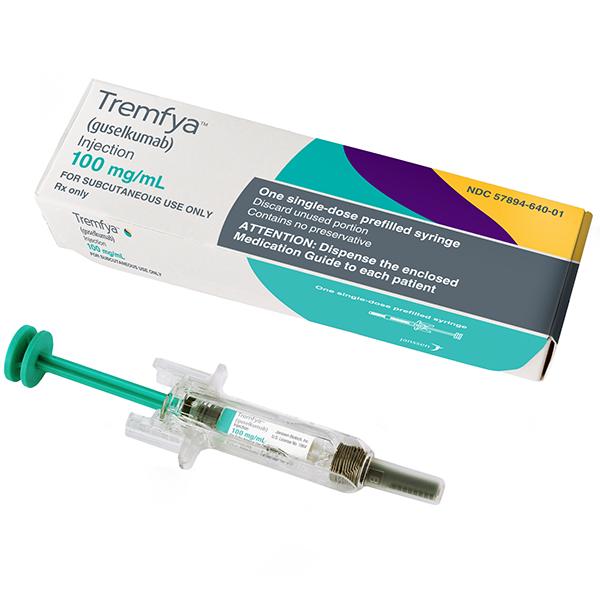Guselkumab Side Effects
Applies to guselkumab: subcutaneous solution.
Precautions
It is very important that your doctor check your progress at regular visits to make sure that this medicine is working properly. Blood tests may be needed to check for unwanted effects.
Guselkumab injection may cause serious allergic reactions, including anaphylaxis. Check with your doctor right away if you have a rash, itching, hoarseness, trouble breathing or swallowing, or any swelling of your hands, face, or mouth after using this medicine.
You will need to have a skin test for tuberculosis before you start using this medicine. Tell your doctor if you or anyone in your home has ever had a positive reaction to a tuberculosis skin test.
It is important to check with your doctor if you have any symptoms of an infection, such as fever or chills, cough or hoarseness, lower back or side pain, painful or difficult urination.
Do not have any live vaccines (immunizations) while you are being treated with guselkumab. Be sure to ask your doctor if you have any questions about this.
Do not take other medicines unless they have been discussed with your doctor. This includes prescription or nonprescription (over-the-counter [OTC]) medicines and herbal or vitamin supplements.
Serious side effects of guselkumab
Along with its needed effects, guselkumab may cause some unwanted effects. Although not all of these side effects may occur, if they do occur they may need medical attention.
Check with your doctor immediately if any of the following side effects occur while taking guselkumab:
More common side effects
- body aches or pain
- chills
- cough
- difficulty in breathing
- ear congestion
- fever
- headache
- loss of voice
- nasal congestion
- runny nose
- sneezing
- sore throat
- unusual tiredness or weakness
Less common side effects
Rare side effects
- headache, severe and throbbing
- hives or welts, itching, skin rash
- white patches in the mouth or throat or on the tongue
Other side effects of guselkumab
Some side effects of guselkumab may occur that usually do not need medical attention. These side effects may go away during treatment as your body adjusts to the medicine. Also, your health care professional may be able to tell you about ways to prevent or reduce some of these side effects.
Check with your health care professional if any of the following side effects continue or are bothersome or if you have any questions about them:
Less common side effects
- bleeding, blistering, burning, coldness, discoloration of the skin, feeling of pressure, hives, infection, inflammation, itching, lumps, numbness, pain, rash, redness, scarring, soreness, stinging, swelling, tenderness, tingling, ulceration, or warmth at the injection site
- difficulty in moving
- muscle pain or stiffness
- pain in the joints
Rare side effects
- redness of the skin
See also:
For healthcare professionals
Applies to guselkumab: intravenous solution, subcutaneous solution.
Immunologic adverse events
- Very common (10% or more): Infections (23%)
- Common (1% to 10%): Tinea infections, herpes simplex infections, immunogenicity[Ref]
Local
- Common (1% to 10%): Injection site reactions (e.g., injection site erythema, bruising, hematoma, hemorrhage, swelling, edema, pruritus, pain, discoloration, induration, inflammation, urticaria)[Ref]
Musculoskeletal
- Common (1% to 10%): Arthralgia[Ref]
Hepatic
- Common (1% to 10%): Elevated liver enzymes[Ref]
Respiratory
- Very common (10% or more): Respiratory tract infection (e.g., nasopharyngitis, upper respiratory tract infection, pharyngitis, viral upper respiratory tract infection) (14%)[Ref]
Nervous system
- Common (1% to 10%): Headache[Ref]
Gastrointestinal
- Common (1% to 10%): Diarrhea, gastroenteritis (including viral gastroenteritis)[Ref]
Hypersensitivity
- Uncommon (0.1% to 1%): Hypersensitivity
- Frequency not reported: Anaphylaxis[Ref]
Dermatologic
- Common (1% to 10%): Urticaria, rash[Ref]
References
1. (2017) "Product Information. Tremfya (guselkumab)." Janssen Biotech, Inc.
Frequently asked questions
- What are IL-23 Inhibitors and how do they work?
- Is Tremfya a biological?
- What are the new drugs for plaque psoriasis?
- How does Tremfya work?
More about guselkumab
- Check interactions
- Compare alternatives
- Reviews (113)
- Dosage information
- During pregnancy
- Drug class: interleukin inhibitors
- Breastfeeding
- En español
Patient resources
Other brands
Professional resources
Other brands
Related treatment guides
Further information
Guselkumab side effects can vary depending on the individual. Always consult your healthcare provider to ensure the information displayed on this page applies to your personal circumstances.
Note: Medication side effects may be underreported. If you are experiencing side effects that are not listed, submit a report to the FDA by following this guide.

